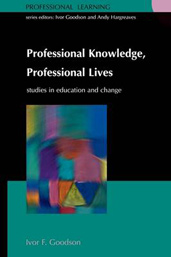Professional Knowledge, Professional Lives: studies in education and change
Educational Research as a Public Intellectual
HCP drew deeply on the egalitarian commitments of sections of post-war British society. The "we're all in it together" spirit of the war emanated in the attempts to build New Jerusalem under the Labour governments of 1945-51. Whilst watered down by subsequent governments, these social justice sentiments were still alive and well in the mid-60’s when HCP was conceived. The spirit is well captured in one of the first Schools Council working papers on raising the school leaving age.
The problem is to give every man some access to a complex cultural inheritance, some hold on his personal life and on his relationships with the various communities to which he belongs, some extension of his understanding of, and sensitivity towards, other human beings. The aim is to forward understanding, discrimination and judgement in the human field - it will involve reliable factual knowledge, where this is appropriate, direct experience, imaginative experience, some appreciation of the dilemmas of the human condition, of the rough-hewn nature of many of our institutions and some rational thought about them (Schools Council, 1965).
That such sentiments could be expressed by establishment figures in 60’s Britain shows that some powerful groups in society were committed to continuing egalitarian projects. It should be remembered that, at almost the same time in the USA, Lyndon Johnson was launching his 'Great Society' initiative. So far from building an egalitarian fortress, Britain was, in fact, part of a broader world movement. Noel Annan has written in his book, 'Our Age' of the substantial support within the liberal elements of the British establishment for Social Justice (Annan, 1995). He judges 'Our Age' lasted from 1945 until well into the 1970s.
One of the offshoots of the Social Justice movement was the Curriculum Development movement in schools - seeking to broaden educational opportunities for all pupils. As MacDonald recalls:
In England, it was largely the lower reaches of the education system that constituted the recruiting grounds of innovation - the colleges of teacher training and the schools themselves. For these upwardly mobile but academically under qualified recruits, there was no ready-made entry into the discipline-based heights of the institutional order. The universities had not been party to the political settlement that saw the ministry, the local authorities and the teacher unions sink their differences over curriculum control in the tri-partite Schools Council.
Thus it was that the patrons and minders of the early innovators, or at least of the more eminent members thereof, saw the need to secure a future for them. Wheels turned and deals were struck. One of them led to the setting up of the Centre for Applied Research in Education (CARE) at the University of East Anglia, which (and this was thought to be a blessing at the time) had no school of education. This kind of package deal (tenured university posts for four people who didn't have two PhD's to rub together) implanted in higher education the 'seeds of its reconstruction - in my view, the totally unintended but most significant and lasting impact of the curriculum development movement (MacDonald, 1991).
